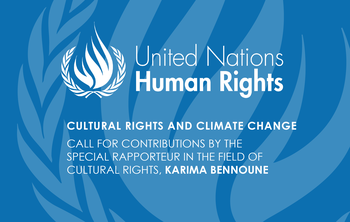Cultural Rights and Climate Change | Contribution to the UN Special Rapporteur Report

Update: Read the new report of the Special Rapporteur in the field of cultural rights, Ms Karima Bennoune, on cultural rights and climate change, at this page and on the website of the mandate. The report makes reference to ICOMOS’s submission to the call for inputs for the report.
The Special Rapporteur will be presenting her report to the General Assembly on Thursday, 22 October, tentatively at 15:00, New York time (EDT).
Access the webcast at http://webtv.un.org/live/
The Special Rapporteur will also be participating in a webinar addressing the theme of her report, entitled “Climate change and cultural extinction: A Human Rights Crisis”, on 21 October, between 13:15 - 14:45 EDT.
To register on zoom, please follow this link.
Karima Bennoune, United Nations Special Rapporteur in the field of cultural rights, recently addressed a call for inputs for a report on “Cultural Rights and Climate Change” to be presented at the United Nations General Assembly in October 2020. The Special Rapporteur believes it is critical to think more broadly about the relationship between culture and cultural rights on the one hand, and addressing climate change on the other.
The report will address both the threats posed by climate change to culture, heritage and the cultural rights guaranteed by international law, including the right to take part in cultural life without discrimination, the rights to artistic and scientific freedom, the right to enjoy and access cultural heritage, as well as the positive potential of culture, heritage, and traditional knowledge, and the enjoyment of cultural rights, to help avoid catastrophic climate change and to adapt to the changes already in motion.
As the Special Rapporteur wrote in her letter inviting all stakeholders to take part, “...cultural resources, such as heritage, traditional knowledge, creativity and scientific freedom, can represent powerful resources for preventing and addressing challenges caused by climate change in a human rights respecting manner. In other words, culture and cultural rights are not only potential casualties; they are also part of the response, part of the solution.”
We are pleased to share ICOMOS’s submission to the call, which was prepared jointly by 3 ICOMOS Working Groups: the Climate Change and Heritage Working Group (CCHWG), the Our Common Dignity Initiative – Rights Based Approaches Working Group (OCDI-RBA WG), and the Sustainable Development Working Group (SDGWG).
See also ICOMOS's work on:
![]() Our Common Dignity Initiative – Rights Based Approaches
Our Common Dignity Initiative – Rights Based Approaches
Photo Credit: © Agenda 21 for Culture
